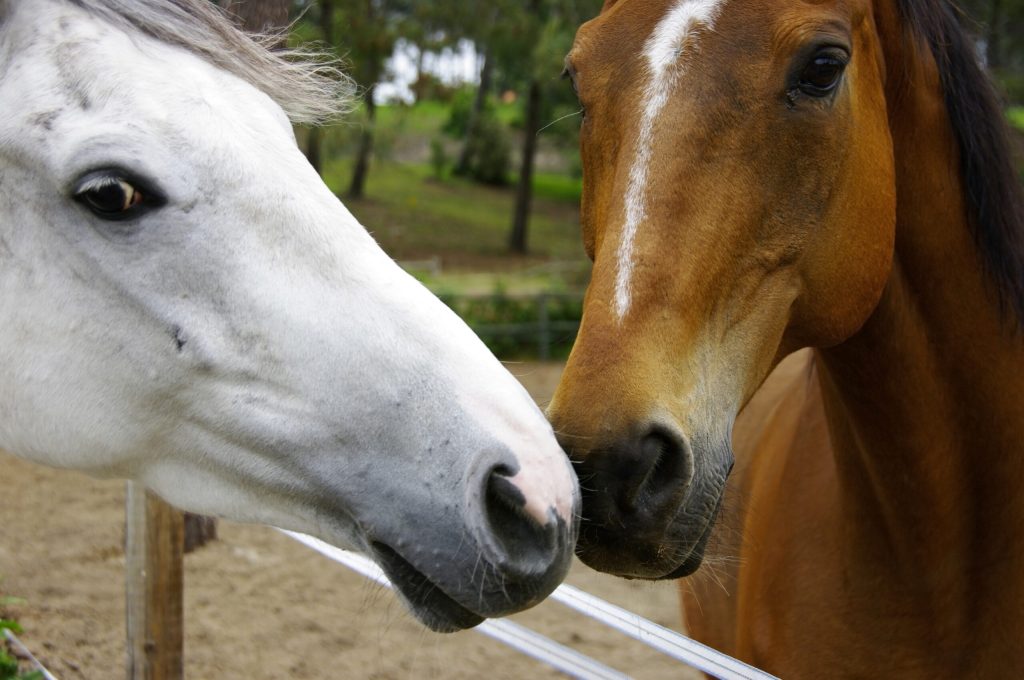
Although many practitioners routinely vaccinate equine patients against equine rhinopneumonitis (EHV-1), those vaccines don’t protect against the neurologic form of equine herpes myeloencephalopathy (EHM). Equine herpesvirus continues to circulate within the horse population.
Platinum Performance sponsored a 2022 podcast with an expert panel of internal medicine specialists to discuss EHV-1. The panelists included Steve Reed, DVM, DACVIM; Lori Bidwell, DVM, DACVAA, CVA; and Josie Traub-Dargatz, DVM, MS, DACVIM.
Reed and Bidwell mentioned that EHV-1 is spread through nose-to-nose contact and by grooms, braiders, community water buckets and shared equipment. Bidwell remarked that “EHV-1 can survive 7-30 days on clothing.”
Another point of concern is that some horse owners erroneously believe that dexamethasone is a “calming agent” and commonly give this corticosteroid the night before showing. That might occur many times a week. Corticosteroids are known for their immune-depressing effects, making the horse an easier target for infectious disease.
Reed pointed out that EHV-1-affected horses develop an initial fever, then break with respiratory disease. He said that the disease can take a rapid turn and that a horse is identified with “a fever in the morning, becomes neurologic in the afternoon, and is on death’s door by midnight.” Even a mild fever is concerning (102–1030 F). By checking temperatures twice daily, a febrile horse can be isolated quickly to protect others at a facility.
Preventative Measures Against EHV-1 at Shows
Traub-Dargatz reminded veterinarians that equine herpesvirus is a latent virus that can reactivate. That means a horse can shed virus in nasal secretions despite no sign of disease. She emphasized that it is critical to use good hand hygiene between groups and individual horses by accessing hand washing stations and/or using hand gel. Other recommendations are practical and preventive, especially at show and sport horse venues:
- Avoid direct horse-to-horse contact.
- Avoid congregation of horses at entry gates and in wash areas, and have those areas cleaned frequently.
- Do not allow horses to share water or feed.
- Eliminate extraneous people from the area if they have no role in horse care.
- Don’t share tack, grooming equipment, buckets or wipe rags. Label these materials—either color code for a barn or with a horse’s name.
- Monitor horses at an event venue with twice-daily rectal temperatures, and for 5-7 days upon returning home.
- Pay close attention to horses with the most immediate contact with a sick horse and monitor with twice-daily rectal temperatures.
- Have an action plan to mitigate spread of disease in case of an outbreak. Pre-planning is important to prepare an isolation area and assign appropriate personnel to handle sick or suspect horses. Not only are diagnostic tools important, but biosecurity must also be enhanced to limit disease spread. This is best tailored for each specific event.
Lessons From Past Outbreaks
In the Utah 2011 outbreak, exposed horses dispersed from the venue to 19 states and Canadian provinces. That outbreak taught everyone a number of helpful things, including the importance of contact tracing information.
Horses that developed EHM tended to be involved in a high number of show classes, including at events prior to the Utah event. One significant finding was that horses supplemented with zinc were at a lower risk than horses not receiving zinc-fortified supplements. Reed cautioned against stacking too many drugs that aren’t necessarily helpful. He said that anticoagulants and anti-viral medications with good bioavailability are important for disease management.
Bidwell discussed her treatment protocol during an active California outbreak: Flunixin twice a day, heparin subQ three times a day, and DMSO intravenous once or twice daily for three days. In addition, horses received valacyclovir (20 grams) 2-3 times a day.
Importance of Stress Mitigation
Stress affects all pillars of the immune system, and Bidwell emphasized that diet should be consistent and should include zinc and lysine. She pointed out that at events, horses are often offered hay and grain from different sources. Horses need restorative sleep, which is significantly disrupted in a show environment. Lighting might be on all night in the barn, especially with braiders who come to prepare a horse for the next day’s event. There also might be grooms or riders playing music, adding to general noise in the barn. She stressed the importance of good horsemanship on all levels to give horses the most optimal environment possible at an event. She also urged owners to consider that horses need ample rest and time off for months rather than engaging them in horse shows week after week, year-round.
Traub-Dargatz also considered transport strategies a critical element in stress mitigation. She emphasized that it is important to load compatible horses next to each other on a trailer. Some horses irritate others, and that can make for many uncomfortable and stressful hours on the trailer. She said owners also should consider how much care the driver takes when hauling a distance. It is best to hire grooms who are adept at handling horses quietly and with patience.
Resources
Practitioners are reminded of invaluable resources that help with guidance in the event of a herpesvirus outbreak:
- Equine Disease Communication Center (EDCC) has links to biosecurity resources: https://equinediseasecc.org/biosecurity
- California Department of Food and Agriculture has developed a biosecurity toolkit in two parts—one for prevention and one for managing disease outbreak: https://www.cdfa.ca.gov/ahfss/Animal_Health/Equine_Biosecurity.html
- AAEP Biosecurity Guidelines: https://aaep.org/sites/default/files/Guidelines/BiosecurityGuidelinesFinal1.pdf
- US Animal Health Association has guidelines for an EHV response plan: https://www.usaha.org/upload/Publication/Top%20Specific/EHM_Guidance_Document_Revised_Fe.pdf








